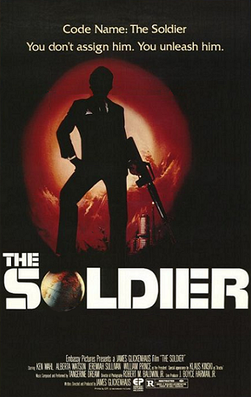
The Soldier (1982 film)
The Soldier (also released as Codename: The Soldier) is a 1982 American Cold War action-thriller film written, directed, and produced by James Glickenhaus[4] The film stars Ken Wahl, Alberta Watson, William Prince, Joaquim de Almeida, and Klaus Kinski,[5] that featured a cameo by rising country superstar George Strait.[6] The film was shot on location in Philadelphia, Buffalo and New York City, New York, West Berlin, and Israel. The ski sequence was filmed in St Anton am Arlberg in Austria. The original score was composed and performed by the German electronic band Tangerine Dream.[7][8]
The Soldier
James Glickenhaus
James Glickenhaus
J. Boyce Harman
- Ken Wahl
- Alberta Watson
- Jeremiah Sullivan
- William Prince
- Klaus Kinski
Robert M. Baldwin
Paul Fried
Embassy Pictures
- June 15, 1982 (United States)
96 minutes
United States
English
$5.3-6 million[1]
Plot[edit]
Renegade KGB agents, headed by Ivan, hijack a plutonium shipment inside the United States and use it to plant a nuclear device in the Saudi Arabian Ghawar Oil Field. They threaten to detonate it, thereby contaminating 50% of the world's oil reserve, unless Israel withdraws its settlements from the West Bank. In Washington, the American President contemplates starting a war with Israel, in order to save the world from a potential oil crisis. Washington is unaware that the KGB are behind this threat. The President orders the head of the CIA to find out who has planted the bomb and to do anything he can to stop this. The Soldier is then activated.
An elite CIA agent codenamed 'The Soldier' (Ken Wahl), working outside the usual channels, is assigned to the case. After Russian agent Dracha attempts to terminate him in the Austrian Alps, he contacts the CIA director from the US embassy in West Berlin. A KGB agent assassinates the director and frames The Soldier for his murder, leaving no official knowledge of his activities other than the president, who has disavowed any knowledge of his actions. On the run from his own government, he seeks refuge in the Israeli embassy. He and his team cooperate with the Israeli Mossad, represented by their director of covert operations Susan Goodman. Meanwhile, the president authorizes military action against Israel.
Given the unpleasant options of the KGB destroying a large part of the world's oil supply or the United States having to invoke a military response to force Israel to remove its settlements from the West Bank, the Soldier decides to take a third option. His team infiltrates and captures a US nuclear missile silo in Smith Center, Kansas, and obtains independent launch capability. As the American military launches their air strikes toward Israel, The Soldier and Susan break into East Berlin by launching their Porsche over the Berlin Wall, confronting the KGB agents and informing them that if their nuke in Saudi Arabia is detonated, his team in Smith Center will nuke Moscow. This forces the Russian KGB to dismantle their device in Saudi Arabia and the American air strike is recalled.
George Strait has a cameo appearance as himself, performing the song "Fool-Hearted Memory".
According to an interview with director James Glickenhaus, the scene with Klaus Kinski was added when the production was under budget and they were able to get Kinski for one day.[9]
Production[edit]
James Glickenhaus first conceived the film's premise after reading John McPhee's The Curve of Binding Energy which explained the methods by which plutonium is transported.[1] Glickenhaus scouted locations in Berlin and Munich, Germany, after receiving an offer of German financing, provided that the project be set partially in that country.[1] Glickenhaus traveled for four weeks before composing a first draft of The Soldier, based on places he had seen and devoid of sequences that would be expensive or difficult to shoot. He then continued his travels for an additional two weeks in order to reaffirm what he had written.[1] After the promised German funding fell through, Glcikenhaus took the project to Avco Embassy Pictures assuring the company his thorough planning would enable them to produce the picture at a lower budget, as they had done with his previous film, The Exterminator.[1] Avco Embassy agreed to provide $6 million in production costs and serve as a worldwide distributor.[1] Glickenhaus arranged foreign sales deals at the 1980 Cannes Film Festival, which fully recouped the film’s budget well before its scheduled domestic release.[1]